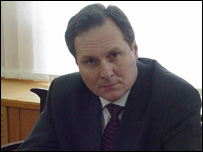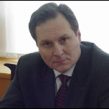
Moldova’s Political Landscape on the Eve of General Elections: Part Three
Publication: Eurasia Daily Monitor Volume: 6 Issue: 54
By:

Moldova’s Social-Democrat Party is being led by the tandem of former Prime Minister Dumitru Braghis (1999-2001) and young businessman-politician Eduard Musuc in these elections. The party targets both Moldovan and "Russian-speaking" voters. Accordingly, it promises to seek an association agreement with the EU, a strategic partnership with Russia, and integration with the CIS at the same time. Braghis had cast his lot with Moscow in the 2004-2005 campaign alongside Serafim Urecheanu but broke with him afterward. A cautious and hesitant personality, Braghis is continuing a 1990s-style "two-vector" approach to relations with the West and Russia. The Musuc business family at one stage fell afoul of the authorities and Musuc senior moved to Transnistria, but Musuc junior is apparently reconciled with Voronin.
The Centrist Union is the outright pro-Russia party in these elections. Its new leader, Vasile Tarlev, served as prime minister for seven consecutive years under Voronin, was honorably discharged in 2008, and shocked the president’s entourage by turning toward Moscow. Initially heading a list of "Friends of Russia in Moldova," Tarlev went on to take over the small Centrist Union and formed a joint list with three other Moscow-oriented groups: Ravnopravye, under its long-time leader Valery Klimenko (a local offshoot of the Congress of Russian Communities); the United Gagauzia movement, under the Gagauz Autonomy’s elected leader (Bashkan) Mihail Formuzal; and the Republican People’s Party, a splinter group from the formerly governing (1994-1998) Moldovan Agrarian-Democrat Party. The Justice Ministry twice invalidated Tarlev’s takeover of the Centrist Union, but the courts overruled the ministry both times (Infotag, March 13).
Tarlev’s group calls for strategic partnerships of Moldova with both the EU and Russia, closer relations with CIS countries, special status for the Russian language in Moldova, legalization of Russia’s military presence by treaty, and negotiations on Transnistria directly with Moscow and the Tiraspol leaders. Tarlev advertises his relations with the One Russia party in Moscow and the Party of Regions in Ukraine, as well as overtures to the Romanian and Bulgarian governing parties. Tarlev happens to be an ethnic Bulgarian, but Bulgarian President Georgi Parvanov has just visited with President Vladimir Voronin in Moldova’s Bulgarian-inhabited Taraclia district to show his support for the president (Infotag, March 3; Basa-press, March 6; Moldpres, March 12, 13; NewsIn, March 15).
Moscow undoubtedly wants the parties of Tarlev and Braghis to absorb "Russian-speaking" and leftist votes from the Communist Party, undermining the latter’s independence and nudging it into a coalition with Tarlev and/or Braghis in the new parliament. In that case Moscow could blackmail the Moldovan government at any time by threatening to withdraw Tarlev’s party from the coalition. This scenario could work if the Communist Party does not find allies independent of Moscow in order to elect the new president and gain approval of the new government.
Such an ally could again be the right-wing Christian-Democrat People’s Party (CDPP) if it passes the six percent threshold to parliament. The CDPP and its leader Iurie Rosca have the greatest longevity in Moldovan politics: Rosca has led the party since 1989 and the party (initially the Popular Front) has sat in parliament uninterruptedly since 1990. After many years of militant anti-communism and Romanian "unionism" (advocating for "Bessarabia’s" unification with Romania), the party underwent a transformation during the parliamentary and presidential elections of March-April 2005. Following the presidential team’s turnabout from a Russian to a European orientation, the CDPP entered into a parliamentary partnership with the Communist Party (see part I in this series, March 19).
The CDPP has since advanced from the role of Romanian irredentist party in "Bessarabia" to that of a European party in the Republic of Moldova and from leading anti-communist street protests to participating in major legislative and policy decisions, alongside a nominally communist majority and president. Consequently, the CDPP has lost a large part of its former electorate and even of its own parliamentary group. Authorities in Romania have ostracized the CDPP and encourage other Romanian-minded parties to supplant it.
Moldova’s Romanian-minded and anti-communist voters have largely switched from the CDPP to nominally Liberal parties (see part II in this series, March 19). Meanwhile, the CDPP is targeting new groups of voters, mainly in young age groups and in those rural districts where the party still controls some towns and village councils. Young, unknown "fresh faces" predominate on the CDPP’s electoral slate. The party’s campaign seems to be spending far less money than other campaigns, including those of its direct rivals.
Eight parties are credited with chances to pass the six percent electoral threshold: the Communists, Liberal-Democrats, unhyphenated Liberals, Our Moldova, the Democrats, Social-Democrats, Centrist Union, and the CDPP. The Communists are expected to come in a distant first while the chances of the other seven parties are basically theoretical. A splintered parliament, devoid of a consistent majority, with unstable a government hostage to squabbling minority factions, could result in a "Ukrainization" of Moldova’s politics.




